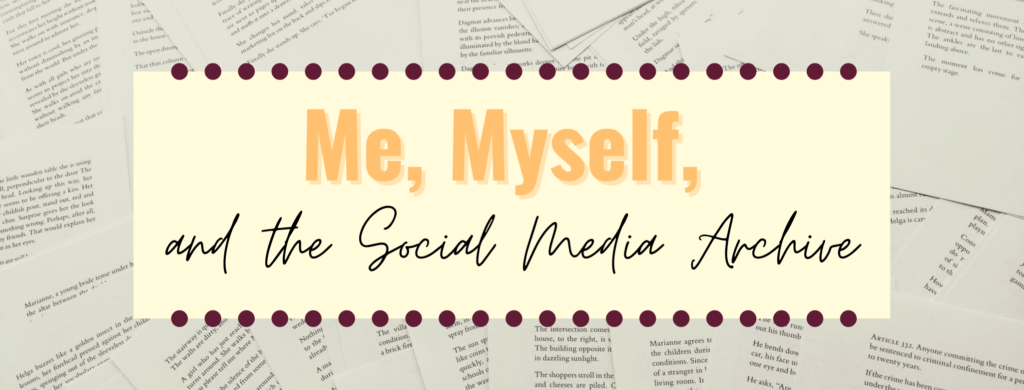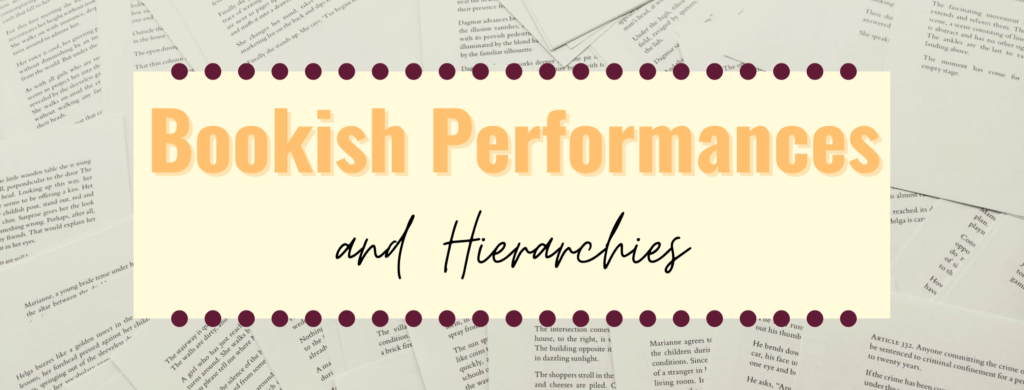I’ve been thinking a lot about the fantasy genre in the past couple of weeks. I mean, I think about it a lot generally – it’s the genre I write, the genre I read most often, and plays into my research fairly often – but recently I’ve been thinking a lot about what a fantasy text needs to do. What is it we as readers are looking for when we dive into a fantasy text? And do the author’s intentions matter?
A couple of weeks ago, I started seeing a whole host of tweets about R. F. Kuang’s The Poppy War. Since this was (and, at the time of writing, still is) my current read, I was excited to see it being spoke about but, from what I could gather, the tweets were spiralling out of a fairly negative situation. A reviewer had called it basic and boring, then recommended a book from a white author as a replacement, and this caused a lot of discussion. And for me, I started thinking a lot about the things I learned while doing my masters. Despite my research having been focused on the translation of fantasy from book to TV or film, was there something in there that connected to the debates that raged about the reviewers background influencing their review?
As I think I mentioned in my first introduction, my masters research looked at adapting a fantasy novel into film or television. I hadn’t originally intended to focus so strongly on the fantasy element – I was more interested in working out if one medium might be more ‘suited’ to adapt a particular source text than another – but the book I chose as my source text, Garth Nix’s Sabriel, made it so that fantasy actually ended up being one of the most important elements. As I adapted Sabriel for each medium, and I’m talking particularly about film here, there were shortcuts I needed to take to maintain pacing and connectability. Sabriel has this amazing magic system but, in the film screenplay, I had to do a lot of simplifying and found myself pulling from the trends I’d seen in other fantasy films.
Fantasy, like all genres, lives within “fuzzy sets” (hello, Attebury!). Not everyone agrees which texts are included – is Dracula fantasy, for example? – but it’s pretty much universally agreed that Tolkien’s Lord of the Rings sits at the centre. It’s kind of the archetype of the genre, creating a familiar formula that everyone nods towards (particularly with high fantasy). But fantasy needs that familiarity. It relies on a balance between what the reader knows and what is new. Too much that is familiar can be boring, too much unfamiliar can seem difficult and overwhelming. We all want escapism but don’t necessarily want to feel lost in with no way of muddling through. Looking at Sabriel, there’s a lot it does differently from the model of fantasy Tolkien provides. There are two reasonably complex magic systems, necromancy, a divided world, and hints at mysterious god-like beings. It also has lots of elements that are familiar – the quest structure, the “Big Bad”, and, once we’re over the Wall, a European-inspired medieval world. In book form, this worked well but, as film also relies on familiarity to communicate visually (e.g. being surrounded by lime green probably means you’re a Disney villain), it struggled in translation.

While the struggles of this balance are perhaps more obvious in film adaptations (hello Eragon film, hello Golden Compass film), it applies to fantasy books too. It’s a genre thing. Readers like to know what sort of book they’re getting into and the things they want to watch out for to know it’s a book they’re going to like. Authors need to know where their book fits in so that they can find their market. But there needs to be a balance, otherwise the genre stagnates and, for the longest time, so much of western fantasy has been focused on a fantasy medieval Europe filled with male heroes, elves, dragons, and a whole lot of white people for “historical accuracy”. Because of this and probably, I’ll admit, because of what I research, I generally find too much familiarity in that kind of fantasy. There’s only so many times that you can have some chosen hero go on a quest through a thinly veiled medieval Europe to save the ring/magic sword/defeat the dark lord, you know? That’s not to say I won’t find one of these kinds of stories and love it, but I need them to do something innovative to bring in the unfamiliarity. Otherwise, I’d rather find a fantasy world set in another time or place so that I feel more like I’m learning from a new world.
So, what does all this have to do with the reviews The Poppy War received? Context. I, as a reader, find the medieval Europe-based fantasies boring because of my history, my context. Most of the fantasy I grew up with used that kind of set-up. The familiar/unfamiliar balance is thrown off by this and so I don’t get to enjoy the enchanting escapism of the genre as much reading these books. The particular review that flared a lot of discussion around The Poppy War, from what I gather, seemed to come from the opposite side of things. The Poppy War is based on the second Sino-Japanese War and, to quote Wikipedia, “an atmosphere inspired by the Song dynasty”. Now, I will fully put my hands up and admit that, thanks to a very British/Euro-centric education system growing up, I knew very little about that historical period before reading the book and that’s partially what made it such an interesting world to delve into. It gave me something new to learn, getting to dive into the history and understanding how the magical elements worked within it. I personally don’t find it overwhelming to have a world that draws on real-world elements that are unfamiliar to me because it’s also got elements that are very recognisable within the fantasy “mega-text” Matthais Stephan mentions (2016), with the boarding school, the quirky mentor, and so on. (I also find it interesting to see what the author is doing with the history they’re pulling from, but that’s a discussion for next week’s blog post) With The Poppy War, the balance of familiar to unfamiliar works for me. But, for that reviewer in this case, it would seem that something didn’t work for them. I haven’t been able to find that exact reviewers comments but, from what I’ve seen, the historical side was probably just as unfamiliar to them. And I guess, while my reaction in the case of The Poppy War was to be excited to go and learn more so that I had more understanding, that’s not going to be the way everyone works.
There are kind of two other reactions I can see happening if the unfamiliar is too strong (for you) in a fantasy (and, full disclosure, I’ve probably had both of these reactions at some point). On the one hand, you can struggle through it and just generally find it a slog that you need to fight through. Result? Boring and difficult. Honestly, I’d probably say that this is what younger me did with The Lord of the Rings. There was so much world to learn and I didn’t have the high fantasy experience I have now to cope with it. Alternatively, you can mentally erase the bits that are too unfamiliar and just focus on the bits that are familiar. In the case of fantasy, it’ll be those core elements from the “mega-text”. Result? Boring and done. (I can’t currently think of an example of a book I’ve done this to, but that’s probably less to do with me not having done it and more to do with the fact that I rendered it so generic that it’s entirely forgotten) Obviously I’m not saying that this is what that particular reviewer experienced, but it’s things I know I have felt. A reader’s context can entirely change the way they interpret a book. Whether this lack of context means it’s fair for a reviewer to give a damning review or not is again a discussion I think I’ll leave for a future post.
The balance of familiar and unfamiliar is one of the things I definitely struggled with as I was writing Shifting Sands. I wasn’t setting it in the pseudo-British/European medieval-inspired world most familiar in fantasy – the magic system and my own cynicism towards it pushed me in another direction – but I was also trying not to base it too much on any particular real-world location because, the fact is, those places aren’t mine. I can’t take that real-world culture or history and use it as my own invention. But obviously I wasn’t creating in a vacuum and, even if I had been, there was also no way I could entirely make up everything. Not only do I not really have the time, or the space in my project to do so, but Shifting Sands already has an unfamiliar form. Too much unfamiliarity would just kill it entirely. So, I’ve tried to create a balance. I have the bits of the world that I’ve made up, like the religion and the magic system. But then there are other things that are much more familiar, with hints of classic fantasy elements like prophecies and the Chosen One (though this is only important to a few of the characters – shaking things up, you know?). Word choices for the simplest things were particularly difficult as I tried to strike this balance and, in all honesty, I’m still not entirely happy with it. Pub or bar sound out of place in the world I’ve created, but tavern doesn’t feel much better. And don’t even get me started on the gourd!
Writing fantasy is a balancing act. Your reader probably picked up your book because they wanted escapism, but they also don’t want to feel entirely like someone dropped in the centre of a new City where no one speaks their language and they have no map or phone to help them. As an author, all you can do is have the best of intentions and hope that your book will find its way into the hands of the right reader.
The situation with The Poppy War gave me a lot of thoughts, so next week I want to dive further into the question of “boring” books and author intention. I might even end up pulling in some of the debates about the responsibility of the reviewer, but I guess we’ll find out once it moves out of note form! Until then, I’d love to hear about the fantasy worlds you’ve loved or hated? Was it that the familiarity/unfamiliarity balance was right/wrong, or was there something else about it that got to you?




Comments
Comments are closed.